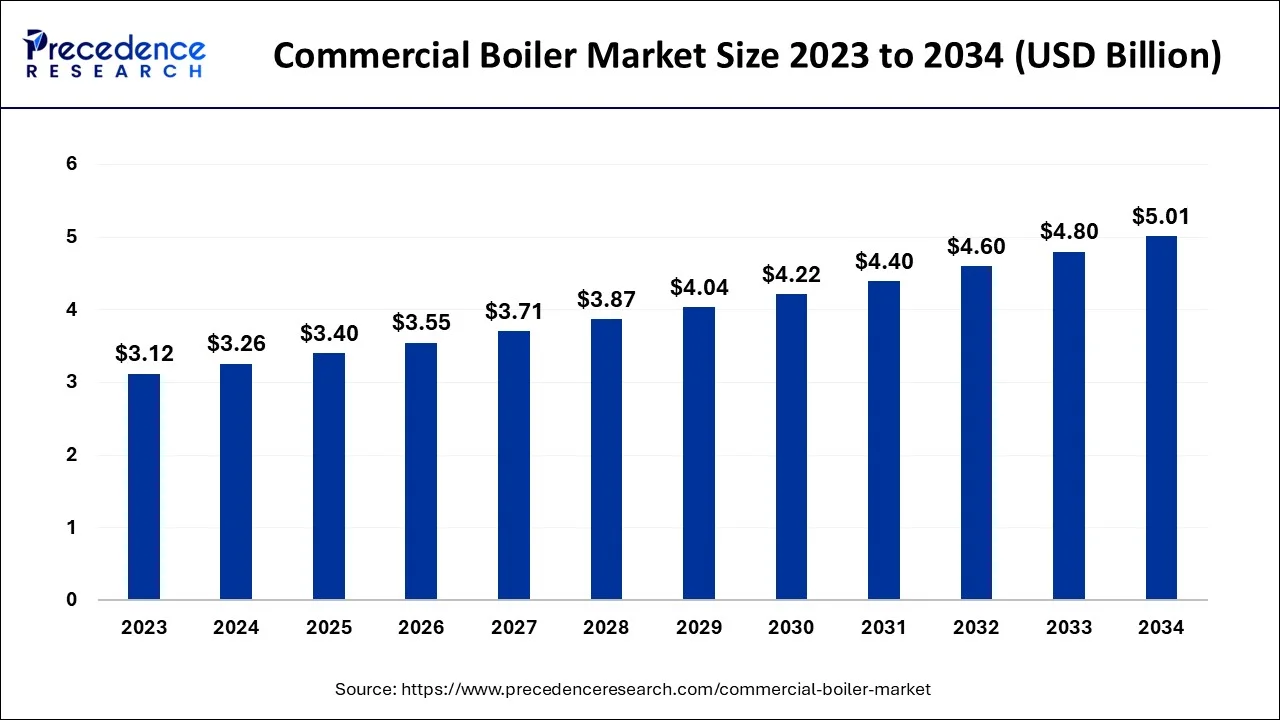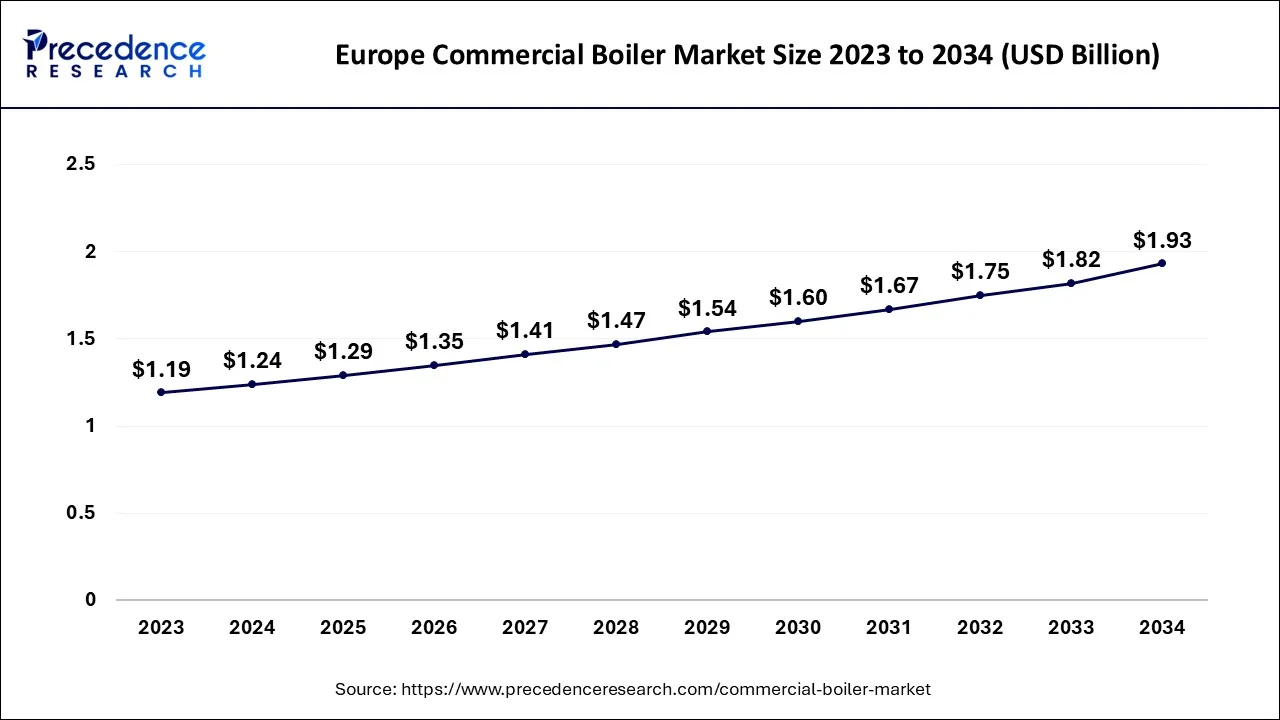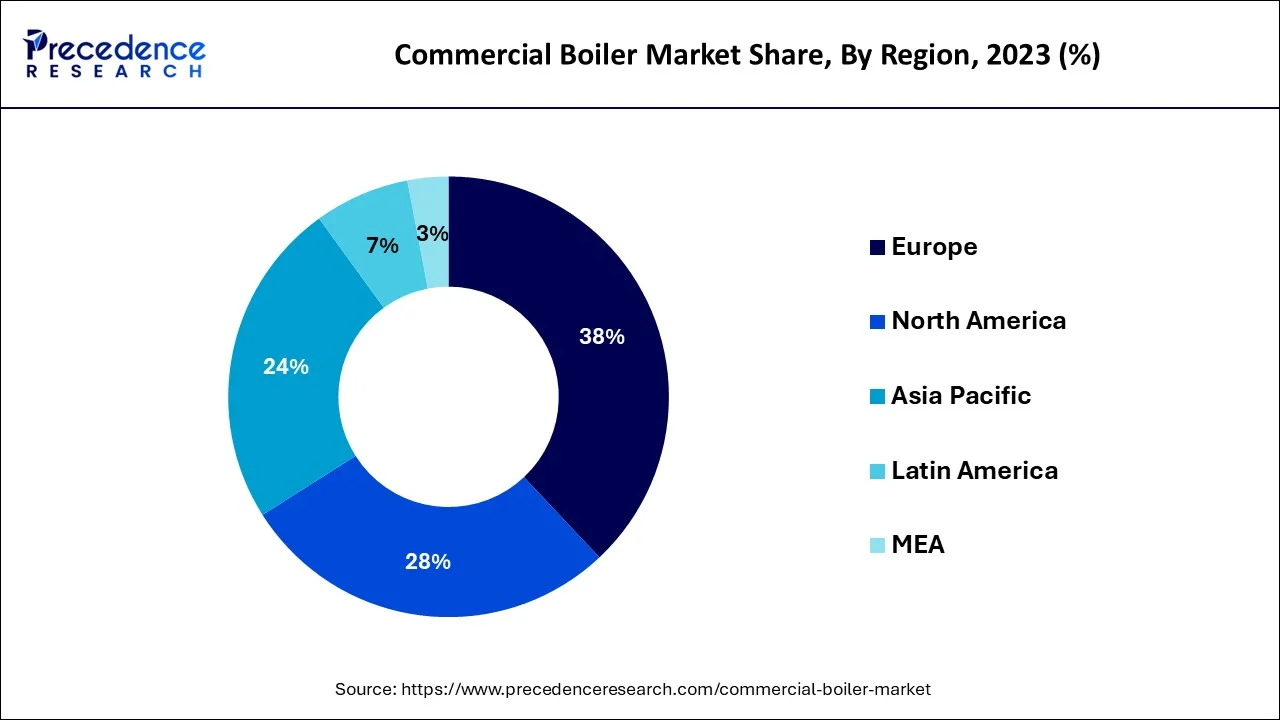January 2025
The global commercial boiler market size accounted for USD 3.26 billion in 2024, grew to USD 3.4 billion in 2025 and is projected to surpass around USD 5.01 billion by 2034, representing a healthy CAGR of 4.40% between 2024 and 2034.
The global commercial boiler market size is estimated at USD 3.26 billion in 2024 and is anticipated to reach around USD 5.01 billion by 2034, expanding at a CAGR of 4.40% between 2024 and 2034.

The Europe commercial boiler market was valued at USD 1.24 billion in 2024 and is predicted to hit around USD 1.93 billion by 2034, at a CAGR of 4.52% from 2024 to 2034.

Based on the region, the Europe segment dominated the global commercial boiler market in 2022, in terms of revenue and is estimated to sustain its dominance during the forecast period. The majority of building constructions in the UK, such as healthcare facilities and educational institutions, rely heavily on low-pressure heating systems.

On the other hand, the North America is estimated to be the most opportunistic segment during the forecast period. Due to strong expansion in the industrial sector and attempts to minimize emissions in the region, the North America is becoming an emerging region in terms of commercial boiler use.
The commercial boilers are pressure systems that heat water for building heating by burning combustible fuels or using electricity. Some boilers use hot water directly, while others use steam-generated water. The heat exchanger transfers heat from the burners or electric coils inside the boiler to the water. The combustion chamber, heat exchanger, burner, and other components make up a commercial boiler. The expanding demand for commercial boilers has been fueled by the growing preference for cost-effective heating systems in commercial enterprises around the world.
The natural gas is utilized more frequently in commercial boilers than solid fuel because natural gas enhances overall efficiency and minimizes dangerous gas emissions. As a result, the government is encouraging the use of natural gas-fired combustion boilers.
In extremely cold countries, commercial boilers are widely used to heat water. The global commercial boilers market is expected to fuel by an increase in the demand for space heating in both commercial and residential buildings, as well as the expansion of the industrial sector. The increased commercial sector investments in the development of economically and environmentally friendly infrastructure are also expected to propel the global commercial boilers market.
The global commercial boilers market is hampered by high boiler production costs. These boilers are very difficult to maintain and install. It must be addressed by the users. The commercial boilers require cylinders with large diameters. The heat radiated by commercial boilers radiators is unbearable.
The global commercial boilers market is expected to rise significantly, owing to rising investments to meet rising energy demand and a fundamental change toward integration of high efficiency heating systems. The expanding healthcare sector, as well as the growth of existing commercial facilities, will influence product acceptance positively. Several government initiatives aimed at expanding green building will boost the commercial boilers market growth during the forecast period.
Although the regulatory standards enforced at the federal, state, and municipal levels frequently overlap and differ, this impacts the market growth. And, as the government continues to tighten down an emission from commercial boilers, it’s more crucial than ever for businesses and organizations to ensure that their systems are up to standards.
The commercial boilers market is influenced positively by a demand for energy efficiency in the commercial sectors. The key market players are interested in solutions that will save them money in the long run while also addressing a wide range of requirements. The combustion, controls, and thermal efficiency are all being improved.
In addition, the commercial boilers market is continuing to expand its product offerings into new areas. A large portion of this drive is due to the healthcare business in particular. The industry experts predict that the commercial boilers industry will expand significantly in response to rising demand for hot water in these facilities, as well as linens and cleaning.
Region wise, the expansion of commercial boilers market is also taking place. The key market players are moving to address the growing demand for boilers in polar climatic regions around the world in recent years.
| Report Coverage | Details |
| Market Size in 2024 | USD 3.26 Billion |
| Market Size by 2034 | USD 5.01 Billion |
| Growth Rate from 2024 to 2034 | CAGR of 4.40% |
| Largest Market | Europe |
| Fastest Growing Market | North America |
| Base Year | 2024 |
| Forecast Period | 2024 to 2034 |
| Segments Covered | Fuel, Technology, Product, Capacity, Application, and Region |
| Regions Covered | North America, Europe, Asia-Pacific, Latin America and Middle East & Africa |
Based on the fuel, the natural gas dominates the commercial boiler market during the forecast period. Natural gas is utilized more frequently in commercial boilers than solid fuel because natural gas enhances overall efficiency and minimizes dangerous gas emissions. As a result, the government endorses the use of natural gas-fired combustion boilers.
On the other hand, the coal is expected to grow at rapid pace during the forecast period. The coal is substantially less reactive than gas or atomized oil since it is a solid fuel. Furthermore, the ash content of coal, which is commonly used in utility boilers, is 200 to 1000 times of oil per British Thermal Unit (BTU) of heat provided.
Based on the technology, the non-condensing segment dominated the market with highest market share during 2020. A non-condensing boiler features a single heat exchanger chamber through which hot gases from the burner flow to heat the water within the exchanger’s walls before existing through the exit flue.
On the other hand, the condensing segment is fastest growing segment in the commercial boiler market. The energy bills and a smaller carbon footprint are the two main advantages of utilizing a condensing boiler. As condensing boilers are so much more efficient than traditional boilers at converting fuel into useful heat, one can use less fuel to heat water.
The various developmental strategies such as business expansion, investments, acquisition, new product launches, partnerships, joint venture, and mergers fosters market growth and offers lucrative growth opportunities to the market players. The major market players are investing in technological developments across their boiler technologies in order to meet the needs of the end users, implying a rise in market share. The increasing R&D spending, as well as strategic partnerships and alliances are some of the primary methods used by leading industry players to achieve a competitive advantage in the market.
Segments Covered in the Report
By Fuel
By Technology
By Product
By Capacity
By Application
By Geography
For inquiries regarding discounts, bulk purchases, or customization requests, please contact us at sales@precedenceresearch.com
No cookie-cutter, only authentic analysis – take the 1st step to become a Precedence Research client
January 2025
July 2024
July 2024